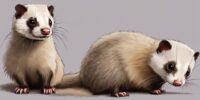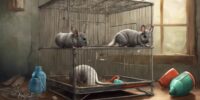What Nutritional Considerations Are Critical for Elderly Ferrets?
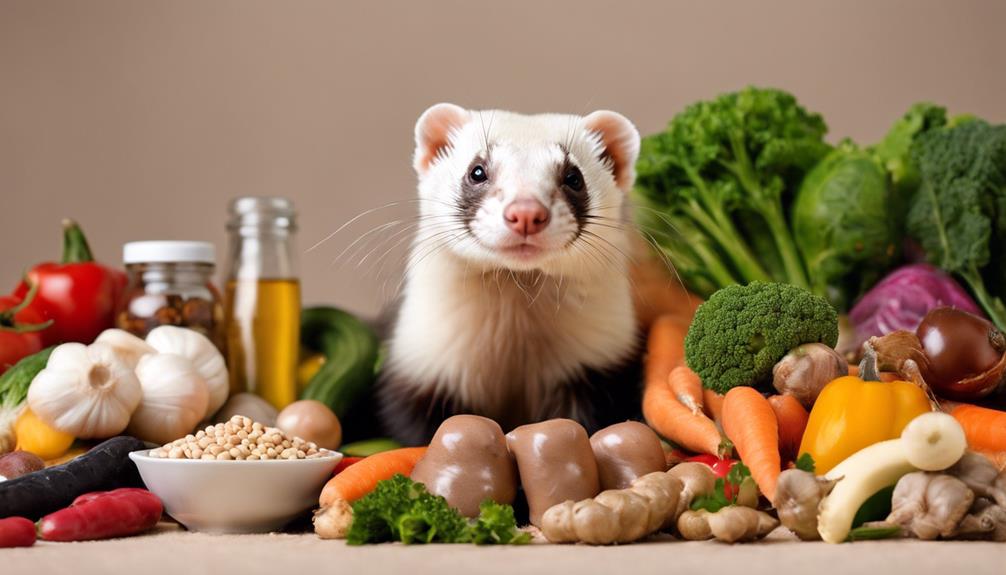
Critical Nutritional Considerations for Elderly Ferrets:
- Protein, fat, vitamins, hydration, and fiber are vital.
- Adjusting diet for age-related conditions is key for longevity.
Protein Requirements
Elderly ferrets require a diet rich in high-quality proteins to maintain their muscle mass and overall health. When considering protein sources for these creatures, it's essential to focus on the amino acid balance and protein quality. Ferrets are obligate carnivores, meaning they rely heavily on animal protein as their primary nutrient source. Animal-based proteins such as chicken, turkey, and beef offer the necessary amino acids required for muscle maintenance and overall health in ferrets.
The digestion efficiency of protein sources is crucial for elderly ferrets to ensure they're obtaining the necessary nutrients from their diet. High-quality proteins are more easily digested and absorbed by the ferret's digestive system, providing them with the essential amino acids needed for various physiological functions. Monitoring the protein intake of elderly ferrets is vital to prevent muscle wasting and maintain their overall well-being as they age.
Importance of Fat Intake

Considering the essential role of fat in the diet of ferrets, attention to the importance of fat intake becomes paramount for maintaining their health and metabolic functions. Ferrets require adequate fat intake to support various physiological processes, including fat absorption and lipid metabolism.
Here are five critical points to consider:
- Energy Source: Fat serves as a concentrated energy source for elderly ferrets, providing them with the necessary fuel for daily activities and bodily functions.
- Vitamin Absorption: Certain vitamins, such as fat-soluble vitamins A, D, E, and K, rely on fat for absorption. Adequate fat intake ensures proper absorption of these essential nutrients.
- Coat Health: Fat plays a crucial role in maintaining healthy skin and coat in elderly ferrets. Insufficient fat intake can lead to dry skin and a dull coat.
- Cell Function: Lipids are essential for cell membrane structure and function. They help regulate cell activities and support overall cellular health.
- Metabolic Regulation: Fat intake influences metabolic processes in ferrets, impacting hormone production, temperature regulation, and overall metabolic balance.
Essential Vitamins for Seniors
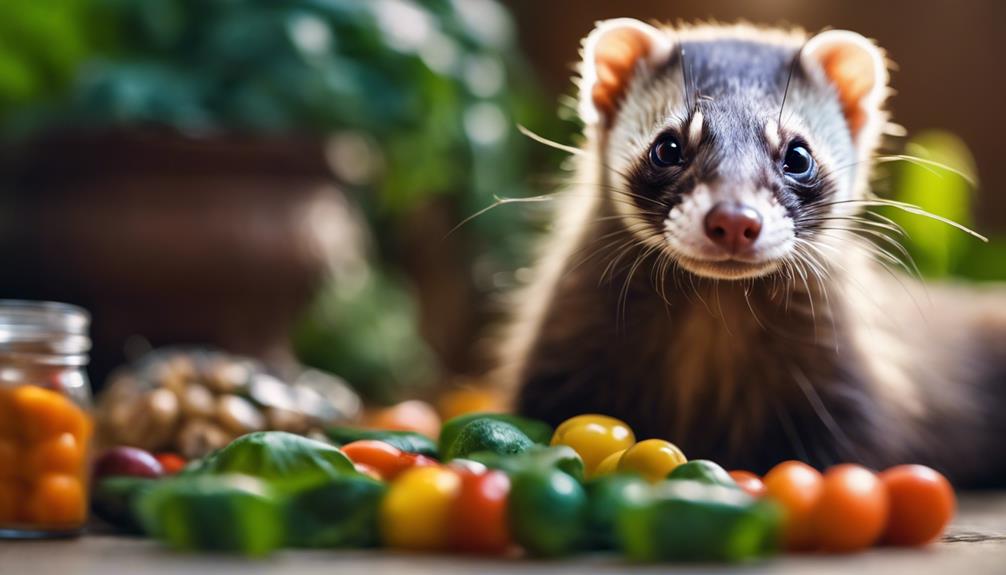
Elderly ferrets require adequate levels of vitamin D to support calcium absorption and maintain bone health.
Additionally, vitamin B12 is essential for proper nerve function and red blood cell production in senior ferrets.
Ensuring these vitamins are included in their diet can help prevent deficiencies and support overall health in aging ferrets.
Vitamin D Importance
Vitamin D plays a crucial role in maintaining bone health and supporting immune function in aging ferrets. Adequate levels of this essential vitamin are vital for overall well-being.
Here are some key points to consider when addressing Vitamin D importance for elderly ferrets:
- Sun Exposure: Direct sunlight enables ferrets to naturally synthesize Vitamin D in their skin.
- Dietary Sources: Include Vitamin D-rich foods like egg yolks and fatty fish in their diet.
- Supplementation: Consult a veterinarian for appropriate Vitamin D supplements, if necessary.
- Regular Vet Check-ups: Monitor Vitamin D levels through blood tests during routine veterinary visits.
- Symptom Awareness: Be alert to signs of Vitamin D deficiency such as weakness or bone issues.
Ensuring proper Vitamin D intake is essential for the health and longevity of elderly ferrets.
Vitamin B12 Sources
To ensure optimal health in aging ferrets, identifying sources of Vitamin B12 becomes paramount as this essential nutrient plays a crucial role in various physiological processes. Ferrets, like humans, cannot produce Vitamin B12 endogenously, necessitating external sources through their diet. Incorporating Vitamin B12-rich foods is vital for meeting the dietary needs of senior ferrets. Below is a table outlining various sources of Vitamin B12 that can be included in a ferret's diet to support their overall health and well-being.
| Vitamin B12 Sources | Serving Size |
|---|---|
| Chicken Liver | 1 ounce |
| Beef | 3 ounces |
| Salmon | 3 ounces |
| Fortified cereals | 1 cup |
| Eggs | 1 large |
Hydration and Water Intake
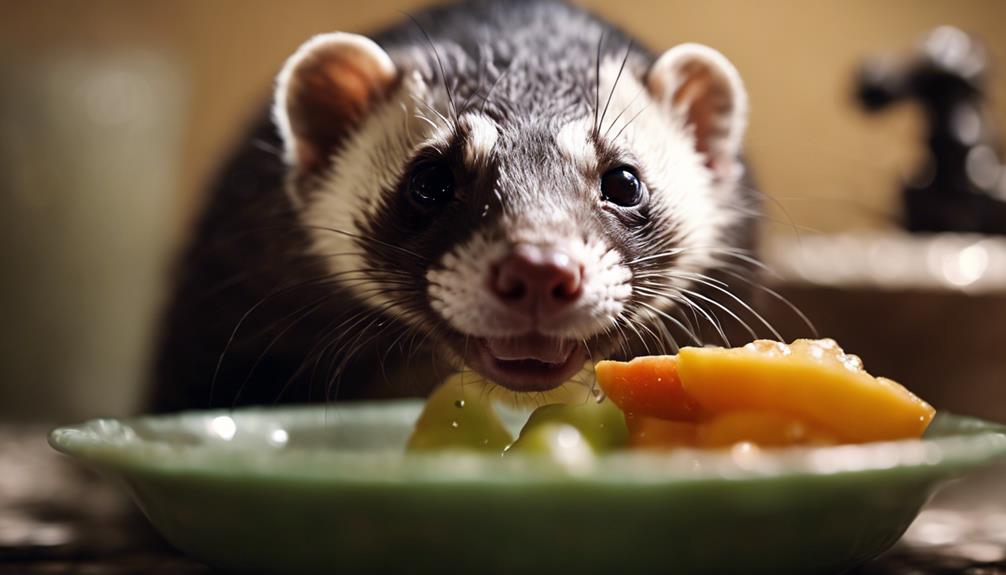
Adequate hydration is essential for maintaining the health and well-being of aging ferrets. Proper hydration plays a crucial role in various physiological functions, including maintaining electrolyte balance and preventing dehydration. Here are some hydration tips and water consumption guidelines to help ensure your elderly ferret stays healthy:
- Provide Fresh Water: Always ensure access to clean, fresh water to encourage regular drinking.
- Monitor Water Intake: Keep track of how much water your ferret is consuming daily to detect any changes that may indicate dehydration.
- Offer Water-Rich Foods: Include moisture-rich foods like wet cat food or raw meat to supplement water intake.
- Hydration Stations: Place multiple water bowls in different areas of the ferret's living space to encourage drinking.
- Consult a Veterinarian: If you notice any signs of dehydration or changes in water consumption habits, seek guidance from a veterinarian promptly.
Fiber for Digestive Health
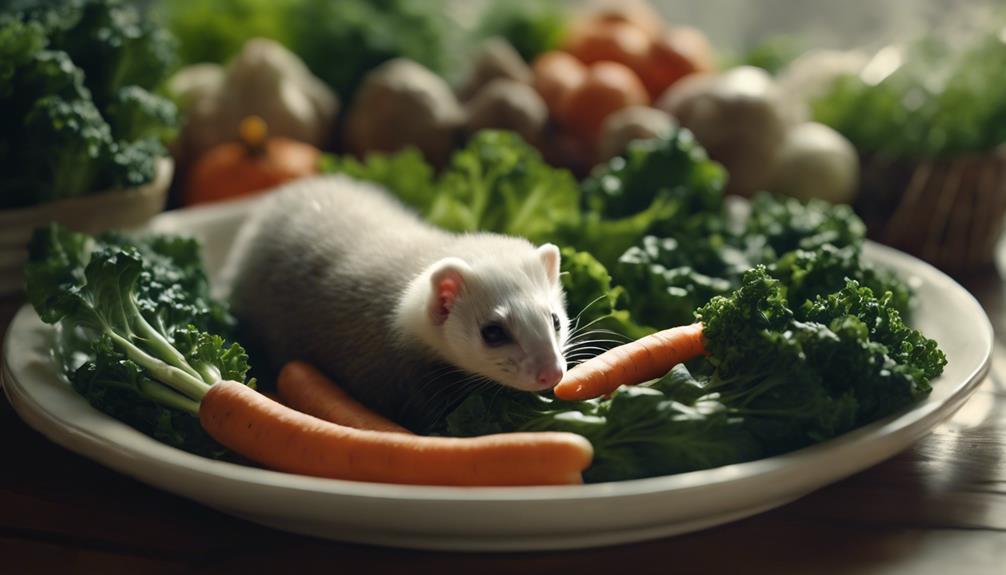
Fiber plays a crucial role in maintaining digestive health for elderly ferrets. Different types of dietary fiber, such as soluble and insoluble fibers, can aid in regulating bowel movements and preventing constipation.
Including fiber-rich foods like high-quality commercial ferret diets, vegetables, and small amounts of fruits can help promote optimal gastrointestinal function in aging ferrets.
Importance of Fiber
A diet rich in fiber plays a crucial role in maintaining optimal digestive health for elderly ferrets. Fiber intake is essential for senior ferrets due to its various benefits:
- Regulates Bowel Movements: Fiber helps prevent constipation and maintains regular bowel movements.
- Supports Gut Health: It promotes the growth of beneficial gut bacteria, aiding in digestion.
- Prevents Hairball Formation: Adequate fiber reduces the risk of hairball formation in elderly ferrets.
- Controls Blood Sugar Levels: Fiber slows down sugar absorption, helping in managing blood glucose levels.
- Assists Weight Management: High-fiber diets can help elderly ferrets feel full longer, supporting weight control efforts.
Types of Dietary Fiber
Rich in various forms, dietary fiber for elderly ferrets plays a crucial role in supporting digestive health. Fiber types vary in benefits, including aiding digestion, preventing constipation, and supporting overall gut health in senior ferrets. The two main types of dietary fiber are soluble and insoluble fiber. Soluble fiber dissolves in water to form a gel-like substance that helps regulate blood sugar levels and cholesterol. Insoluble fiber adds bulk to the stool, aiding in regular bowel movements and preventing constipation. By incorporating a variety of fiber types into the diet of elderly ferrets, caregivers can promote optimal digestive health and overall well-being in their senior furry companions.
| Fiber Type | Benefits |
|---|---|
| Soluble | Regulates blood sugar, lowers cholesterol |
| Insoluble | Adds bulk to stool, prevents constipation |
Fiber-Rich Food Sources
An essential component of a well-rounded diet for elderly ferrets includes incorporating various high-fiber foods to support their digestive health and overall well-being. When considering fiber-rich food sources for senior ferret diets, it's crucial to choose options that promote gut health and aid in digestion.
Some high fiber treats and foods suitable for senior ferrets include:
- Pumpkin: Rich in fiber and nutrients, pumpkin can help regulate digestion.
- Peas: A good source of fiber that can be a tasty addition to their diet.
- Green beans: High in fiber and low in calories, making them a healthy choice.
- Oatmeal: Provides fiber and can be a comforting treat for elderly ferrets.
- Carrots: Crunchy and high in fiber, carrots can be a beneficial snack option.
Managing Weight and Obesity

Managing weight and obesity in elderly ferrets requires careful monitoring of their diet and activity levels to ensure they maintain a healthy body condition. Implementing appropriate exercise routines is essential to prevent weight gain and maintain muscle mass. Engaging ferrets in interactive play sessions or providing tunnels and climbing structures can help increase their activity levels. Additionally, practicing portion control by measuring out the daily food intake can prevent overeating.
Incorporating nutrient-dense treats into their feeding schedule can aid in weight management. Opt for treats that are high in protein and low in fat to support their nutritional needs without adding excess calories. It's crucial to adjust the overall diet to accommodate these treats, ensuring they don't disrupt the balance of essential nutrients.
Regularly evaluating the ferret's body condition through physical examinations and weight checks is vital in managing their weight. Consulting with a veterinarian for guidance on proper diet adjustments based on the individual ferret's needs is recommended to prevent obesity-related health issues. By carefully monitoring diet, activity levels, and treat intake, elderly ferrets can maintain a healthy weight and overall well-being.
Special Dietary Considerations

Elderly ferrets may require special dietary considerations to address age-related changes in their nutritional needs. As ferrets age, their digestive health and nutrient absorption may be compromised, necessitating adjustments to their diet for optimal health and well-being.
- Increased Protein: Older ferrets may benefit from diets with higher protein content to support muscle mass maintenance and overall health.
- Easy-to-Digest Foods: Selecting foods that are gentle on the digestive system can help prevent gastrointestinal issues in elderly ferrets.
- Supplements: Providing supplements like probiotics can promote a healthy gut flora and aid in digestion.
- Hydration: Ensuring adequate water intake is crucial for elderly ferrets to support their overall health and prevent dehydration.
- Balanced Nutrient Profile: Offering a well-balanced diet rich in essential nutrients can help meet the changing nutritional requirements of aging ferrets.
Frequently Asked Questions
Can Elderly Ferrets Still Eat Treats, and if So, How Often Should They Be Given?
Elderly ferrets can enjoy treats, but moderation is key. Limit treats to prevent digestive issues. As ferrets age, their nutritional needs change. It's important to balance treats with their overall diet to support their aging process and digestive health.
Are There Any Specific Foods That Should Be Avoided in the Diet of an Elderly Ferret?
When considering dietary restrictions for elderly ferrets, it's important to avoid foods high in sugar, fat, and carbohydrates. These can pose health risks such as obesity and diabetes. Moderation is key, with alternatives like lean protein and vegetables recommended.
How Can I Ensure My Elderly Ferret Is Getting Enough Exercise to Maintain Their Health?
In ensuring a senior ferret's health, indoor activities play a crucial role. Mental stimulation through interactive toys and obstacle courses can aid in weight management. Regular playtime not only promotes exercise but also strengthens the bond between ferret and owner.
Are There Any Supplements That Are Recommended for Elderly Ferrets to Support Their Overall Health?
Supplement options for elderly ferrets should be carefully chosen based on their specific dietary restrictions. Consult a veterinarian for recommendations tailored to the individual ferret's needs. Consider factors like protein, vitamins, and minerals to support overall health.
What Are Some Signs That My Elderly Ferret May Be Experiencing Nutritional Deficiencies That Need to Be Addressed?
Dietary changes in elderly ferrets may manifest as weight loss, decreased energy levels, and poor coat condition. Monitoring these signs closely can help identify and address potential nutritional deficiencies to support the overall health of the ferret.

